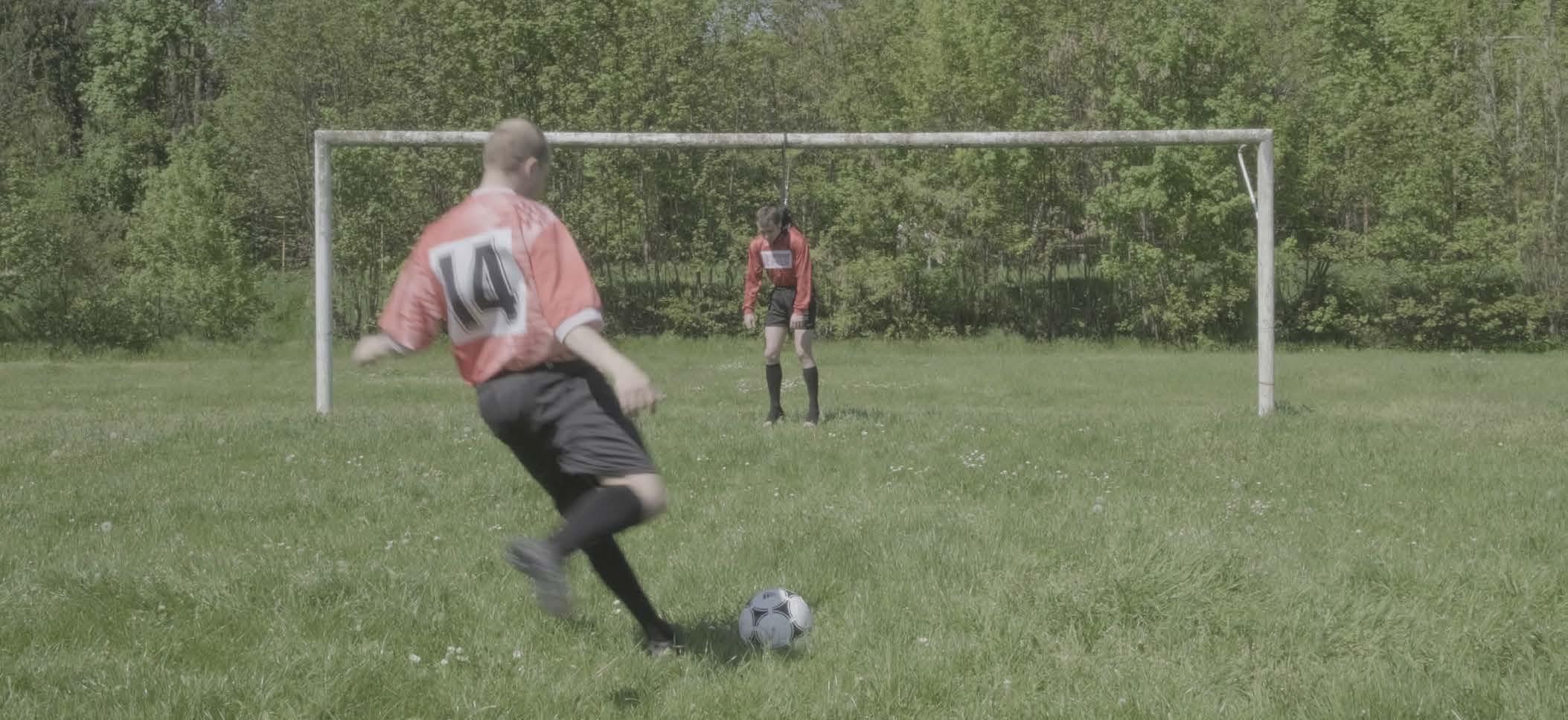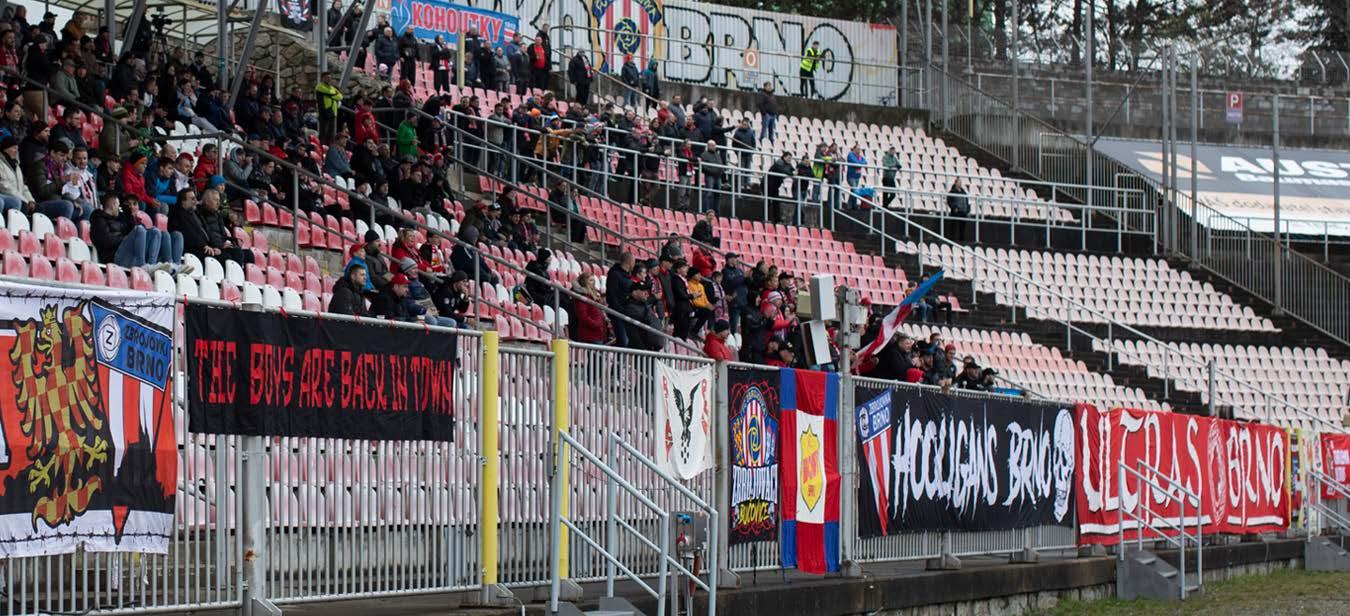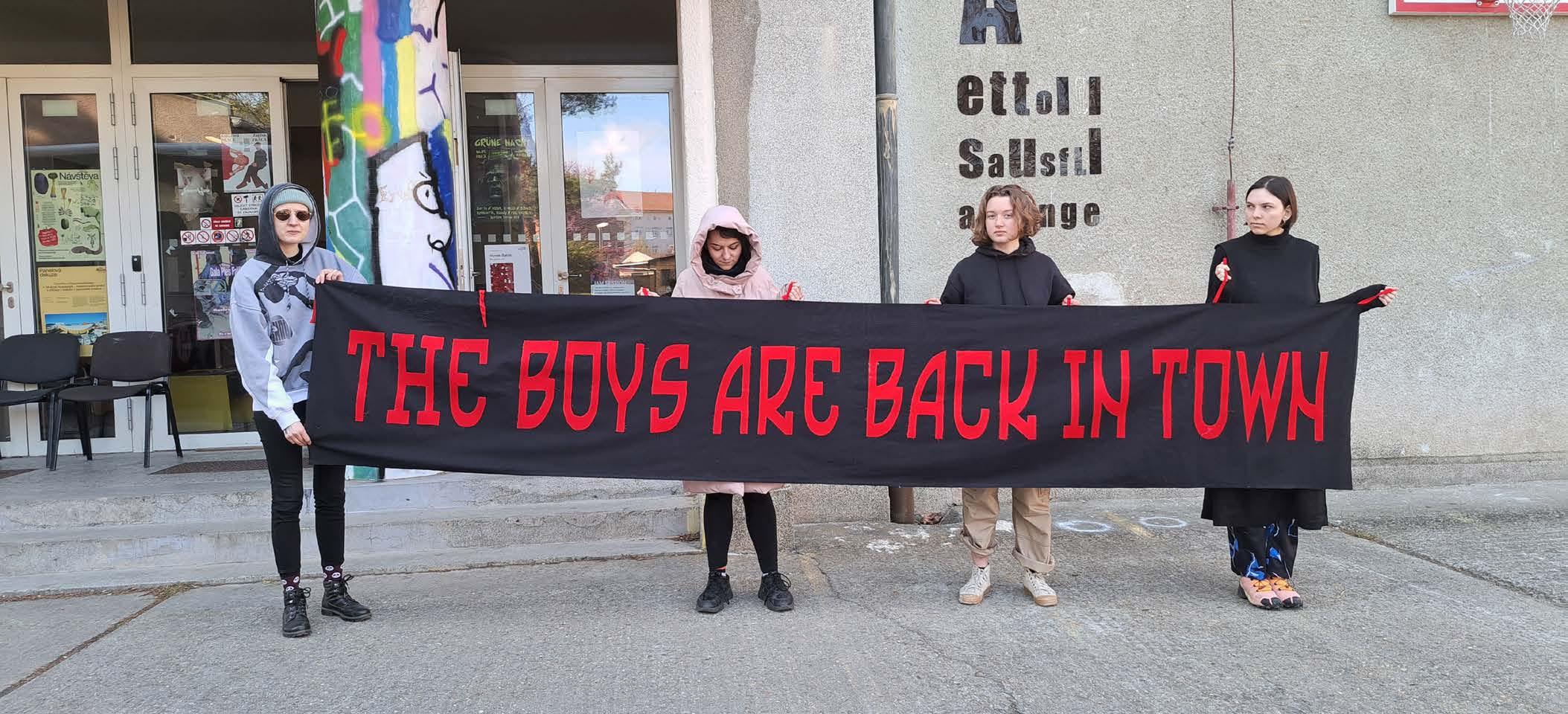
3 minute read
Vojtěch Škuta
Pro Vojtěcha Škutu (* 1996) není primárním médiem pouze fotografie. Do své práce dlouhodobě zapojuje také pohyblivý obraz nebo audio. Škuta čerpá ze své osobní analýzy chování společnosti. Jako zdroj jeho prací mu slouží prostředí, ve kterých se on sám už od dětství pohybuje a kde nalézá zažité vzorce chování jednotlivých členů, na něž se snaží kriticky upozornit. Ve Škutově zkoumání se odrážejí osobní zkušenosti, všímavé pozorování a schopnost upozornit na podstatu celospolečenských problémů. Autor pochází ze severní Moravy a dlouhodobě se ho dotýká téma odsunu sudetských Němců. Tuto širokou problematiku ale neřeší z pohledu historického, nachází vzorce chování lidí podobné těm z poválečné doby v jiných současných společenstvích, kterých je on sám součástí. Diplomová práce s názvem Radikaler Fußballer (2023) je studií procesu radikalizace a kritikou extremismu v prostředí fotbalových fanoušků. Odkazuje na stále se opakující schémata chování lidí, na radikální vrstvu společnosti, její vnitřní nastavení a hranice. Spojuje dvě zdánlivě nesouvisející prostředí a dva časové úseky, historickou paměť území bývalých Sudet a prostředí současných ultra fans. Oba prostory provází lidská touha po osvojení si určitého území, stanovení pevných hranic, kde bude mít moc jen jedna vrstva společnosti a kde se psychické či fyzické násilí stává nástrojem boje za práva většiny. Výsledná scénografická instalace, na jejíž podobu měla vliv také dlouhodobá Škutova spolupráce s divadlem, využívá několik médií – video, audionahrávky, fotografie a textil. Intermediálním přístupem k tématu se Škuta snaží postihnout širokou škálu vrstev extremismu. K dosažení záměru využívá některé postupy ultra fans, jako je vokální skupinová podpora či vyvěšování transparentů na fotbalových stadionech.
Ty jsou pro něj nástroji ke kritice společenství a zkoušce její integrity. Dvě zinscenovaná videa, která jsou součástí instalace, svou ironií odlehčují celkovou atmosféru tématu, ale zároveň metaforicky vystihují stále se opakující negativní stránky společenských skupin. Vojtěch Škuta absolvoval bakalářské studium tvůrčí fotografie u Michala Kalhouse a Imricha Vebera na Ostravské univerzitě. Je magisterským absolventem Ateliéru fotografie na FaVU VUT v Brně u Ivarse Gravlejse a Tomáše Javůrka. Vystavoval na Fotofestivalu v Uničově (2019) nebo v Galerii U Mloka v Olomouci (2020). Byl součástí několika skupinových výstav jako například Pokoje, Praha (2017); #vztahy, Rainbow gallery, Prostějov (2018); Josefov III, Bastion IV, Josefov (2019) nebo Živý pohyb, Galerie Dukla, Ostrava (2021). Dlouhodobě pracuje také v divadelním prostředí. Spolupracoval na divadelních inscenacích v letní divadelní dílně Chotěborky nebo v projektu „krajina, místo, historie“, které studenti*studentky JAMU vytvářeli pod vedením Matěje Růžičky ve Stříbrných Horách na Rýmařovsku.
Anežka Chalupová
For Vojtěch Škuta (* 1996) photography is not the primary medium. His work has long involved moving image or audio. Škuta draws on his personal analysis of the behaviour of society. The source of his work is the environments in which he himself has lived since childhood, and in which he finds established patterns of behaviour in individual members, which he tries to draw critical attention to. Škuta’s research reflects his personal experiences, keen observation and the ability to draw attention to the essence of social problems. The author comes from North Moravia and has long been concerned with the topic of the displacement of the Sudeten Germans. However, he does not address this broad issue from a historical perspective but finds patterns of human behaviour similar to those of the post-war period in other contemporary communities of which he himself is a part. His diploma thesis, Radikaler Fußballer (2023), is a study of the process of radicalization and a critique of extremism among football fans. It refers to recurring patterns of human behaviour, the radical segment of society, its internal settings and boundaries. It connects two seemingly unrelated environments and two time periods; the historical memory of the territory of the former Sudetenland and the environment of contemporary ultra fans. Both spaces are accompanied by the human desire to conquer territory, to establish firm boundaries where only one segment of society will have power and where psychological and physical violence become instruments of struggle for the rights of the majority. The resulting scenographic installation, whose form was also influenced by Škuta’s long-term collaboration with theatre, uses several media—video, audio recordings, photography, and textiles. By taking an inter-media approach to the subject, the artist attempts to capture the wide range of layers of extremism. To achieve his intention, he uses some of the practices of ultra fans, such as vocal group support and hanging banners in football stadiums. These are tools for him to criticise this community and test its integrity. The two staged videos that are part of the installation lighten the overall atmosphere of the theme with their irony, but at the same time they metaphorically depict the recurring negative aspects of social groups.
Vojtěch Škuta completed his bachelor’s studies in creative photography under Michal Kalhous and Imrich Veber at the University of Ostrava, and is a master’s graduate of the Photography Studio at the FFA BUT under Ivars Gravlejs and Tomáš Javůrek. Škuta exhibited at the Fotofestival in Uničov (2019) and at the U Mloka Gallery in Olomouc (2020). He was part of several group exhibitions, such as Rooms, Prague (2017); #relationships, Rainbow Gallery, Prostějov (2018); Josefov III, Bastion IV, Josefov (2019), and Live Movement, Dukla Gallery, Ostrava (2021). He has also been working in the theatre environment for a long time. He has collaborated on theatre productions at the Chotěborky summer theatre workshop and in the project “Landscape, Place, History”, which JAMU students created under the guidance of Matěj Růžička in Stříbrné Hory in the Rýmařov region.












